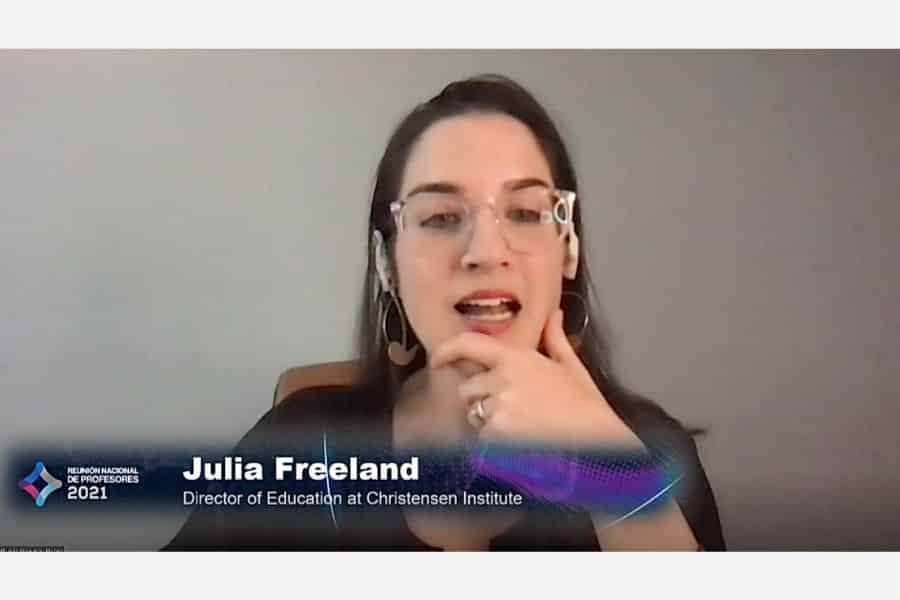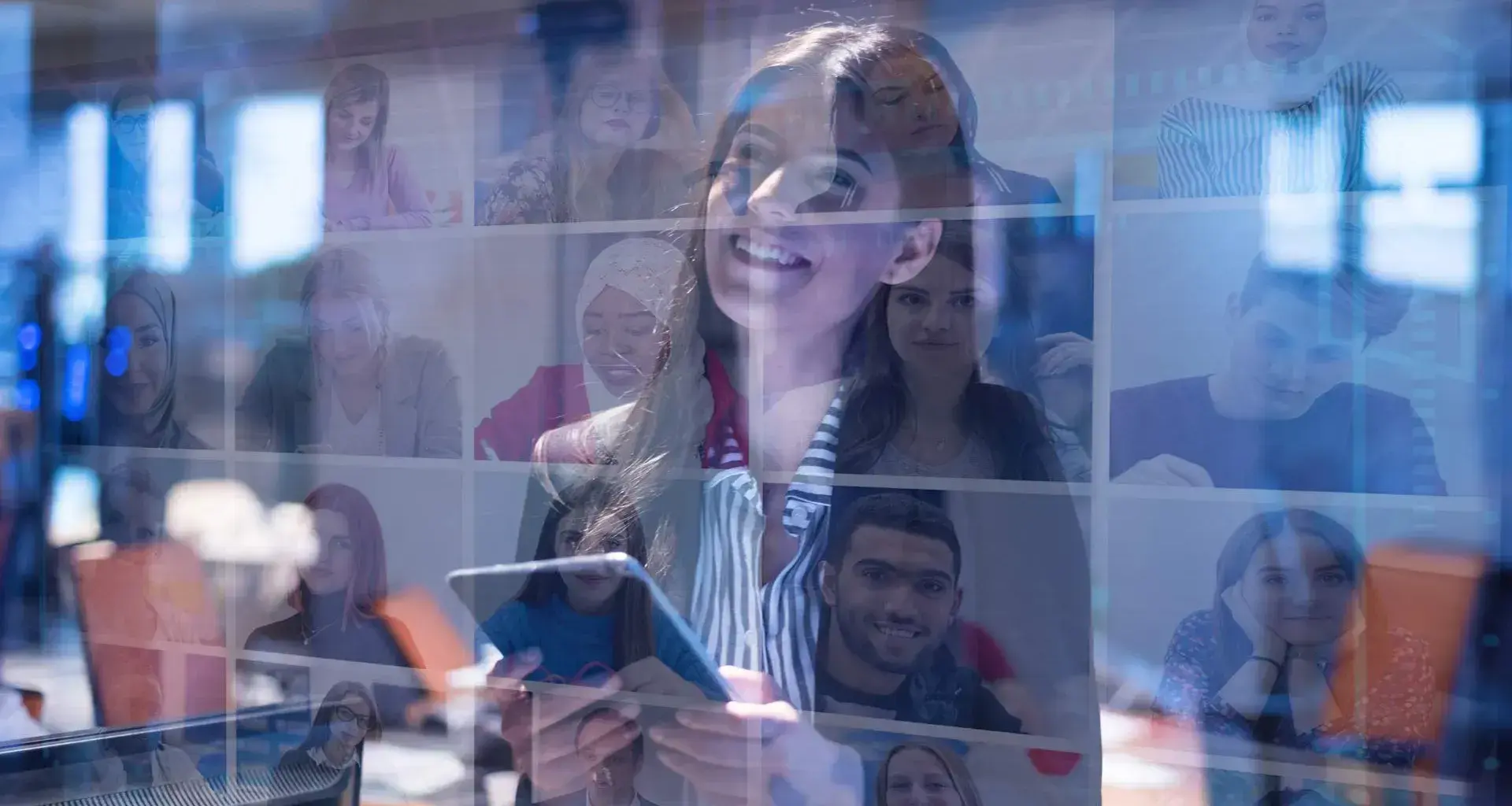Today, interpersonal relationships are essential for extending access to employment opportunities for students, said a specialist in educational trends.
Julia Freeland explained that one of the biggest challenges for teachers is ensuring that students can access valuable networks of teachers, peers, and well-known figures in their fields.
Speaking on a panel entitled ‘The power of networking and connectivity’ at Tec de Monterrey’s National Teachers’ Conference, Freeland said that hybrid classrooms must be structured so as to put these relationships within reach.
“When we teach, we must purposefully rethink the way we’re connecting our students to these networks,” said the panelist.
8 tips for networking in hybrid mode
Freeland shares tips for building relationships with and among students in hybrid mode:
- Build familiarity with students.
It is essential to know the names of your students and conduct a daily check-in at the beginning of each class.
Try to have video messages ready to share with the class if you’re absent.
- Introduce yourself and get to know your students’ backgrounds.
Create a biography sharing your work as a teacher and mentor. You could use video tools to produce this.
Students could do a personal timeline exercise, or you could ask them to write short essays in the style of “This I believe”.
- Provide brief advice when requested.
Provide quick but constant mentoring so that students have the opportunity to broaden their horizons and/or life goals.
- Create a thought-out cohort design.
Start small group activities that foster and accelerate the development of a sense of trust among students.
These activities, whose main objective is developing trust rather than a product to be submitted and/or evaluated, should be short.

- Plan group work to include accountability.
It is very important that group work balances group interdependence with a sense of individual responsibility.
Julia recommends assigning rotating roles to keep student morale high and improve engagement.
- Foster opportunities for students to be leaders.
Encourage question and answer sessions led by the students themselves rather than just answering their questions directly.
If you have students with expertise in certain areas, you should provide them with opportunities and/or spaces for them to support their classmates.
- Create opportunities for interaction with industry leaders.
Try to have guests from the same industry or who work in related areas provide feedback and real-life experiences to your students.
Assign student-led interviews so they can meet people and make connections in industry.
- Make use of educational technologies to promote connectivity.
Take advantage of different technological tools to have interactions with those students who are out of reach because of time and/or location.
Create a culture of emotional and instrumental support through those communication channels (chat, WhatsApp, Remind, etc.) available to you.
“It’s not only the technology; it’s how you adapt your model to it.”

Why are these networks so important?
The expert said that current educational systems commonly underestimate the power of networks and interpersonal relationships as resources are focused on learning.
“We all have stories, personal relationships, mentoring, and even random encounters that opened doors to possibilities that led us to where we are today,” Julia explained.
According to the researcher, universities tend to put more emphasis on what students know than who they know.
However, it is argued that opportunity exists at the intersection of these two areas, as statistics show that 50% of jobs come about through personal connections, in the United States at least.
“We must prepare students with the skills to enter the job market, but we should also be thinking about the connections they have access to,” she said.
“We must prepare students with the skills to enter the job market, but we should also be thinking about the connections they have access to.”
What are the benefits of these types of relationships?
The expert pointed out how having students develop diverse and positive relationships early in their careers can help shape their professional interests.
Similarly, having access to support networks reduces the possibility of student disengagement and helps develop a sense of belonging.
“Peer and faculty relationships are the biggest indicators of a positive college experience,” Freeland stressed.
Likewise, industry networks should be given credit as they can help position graduates within a flexible job market because of their breadth and diversity.
Finally, the long-term benefits of social capital have effects on career options, risk reduction, and graduate longevity.
How can you promote networking?
“Our research continues to show that networks are more powerful and have further reach than individual mentors,” Julia said.
This being the case, the researcher explained how universities can expand the power of networks by fostering three types of relationships:
- Student-faculty relationships
By creating storytelling check-ins for students to get to know their teachers and creating opportunities for mentoring.
- Peer relationships
Through projects that allow for collaborative relationships and individual development.
- Student-industry relationships
Making use of online connections to replace weak ties to industry that would otherwise be out of the reach of students.
“When we teach, we must purposefully rethink the way we’re connecting our students to these networks.”
Who is Julia Freeland?
The expert is the director of educational research at the Clayton Christensen Institute for Disruptive Innovation, where she works on disruptive innovation topics in education systems.
Holding a BA from Princeton University and a JD from Yale Law School, she is now an expert in the fields of blended learning and skills-based learning.
Her research aims to highlight new approaches and tools to expand students’ ability to navigate through new networks of peers, mentors, and professionals.
The National Teachers’ Conference
This is the most important annual event for Tecnológico de Monterrey’s undergraduate and graduate faculty.
Teachers from all National Schools meet to share lessons learned, best practices, and experiences. Activities and forums are set up to address important issues for the next school year.
David Garza, rector and executive president of Tec, thanked teachers for all their work this year.
“Tec de Monterrey stands out thanks to the enthusiasm and dedication that you have all put in. Thank you for your commitment and I look forward to you continuing with the same great passion for educating future leaders who are going to transform our country,” he said.
The National Teachers’ Conference is being held virtually from July 5 to 8.
YOU MAY ALSO BE INTERESTED IN:






